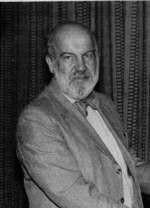Richard E. (Dick) Merwin
Born October 2, 1922, East Palestine, Ohio; died August 28, 1981, Washington, D.C.; outstanding pioneer computer engineer who was a contributor to the concepts and implementation of microprogramming.

Education: BSEE, Moore School of Electrical Engineering, University of Pennsylvania, 1943; PhD, University of Pennsylvania, 1965.
Professional Experience: ENIAC Project, Moore School of Electrical Engineering, University of Pennsylvania; MANIAC computer project, Los Alamos National Laboratory; IBM Corp., 1951-1965; deputy director of data processing, US Army Ballistic Missile Defense Program Office, 1965-1977; research professor of computer science, George Washington University, 1977-1981.
Honors and Awards: IBM Academic Fellow, 1961-1965; fellow, IEEE, 1975; ACM SIGMicro Award, 1978.
Richard Merwin was a pioneer in the field of digital computer engineering, and, at the time of his death, was president of the IEEE Computer Society. A 1943 graduate of the Moore School of Electrical Engineering at the University of Pennsylvania, he participated in the development of the ENIAC computer. He then organized the engineering effort for the MANIAC computer built at Los Alamos National Laboratory. He was elected a fellow of the IEEE in 1975 for "development of ferrite core memories and computer hardware and software programs." In 1978, he received the second ACM SIGMicro Award for outstanding contributions to microprogramming.
After participating in the initial development of digital computing, he contributed to the commercial development of digital computers at IBM from 1951 to 1965. He worked on the IBM-702 and 705 computer systems, and was engineering manager of STRETCH, the computer which pushed the technology of the 1950s to its limit, and was a major influence on the design of computers for many years thereafter.
An IBM academic fellow from 1961 to 1965, Dick Merwin earned a doctorate from the University of Pennsylvania. He was deputy director of data processing of the US Army Ballistic Missile Defense Program Office until 1977. Merwin then joined George Washington University in Washington, D.C., as a research professor of computer science, working on microprogramming, software management, and distributed data processing.
Despite a busy and productive career, Dick Merwin found time to become a leader in professional societies. His generosity of spirit and genuine helpfulness were important in the progress of the computer profession. After his untimely death, the IEEE Computer Society established an award for distinguished service in his name.
BIBLIOGRAPHY
Significant Publications
Merwin, R.E., "The IBM 705 EDPM Memory System," IRE Trans. Electronic Computers, Vol. EC-5, 1956, pp. 219-223.
UPDATES
Richard Merwin died on August 28, 1981. (THVV, 2017)
New content Copyright © 2013-2023 by the IEEE Computer Society and the Institute of Electrical and Electronics Engineers Inc.
All rights reserved. This material may not be reproduced or redistributed without the express written permission of the copyright holder.
